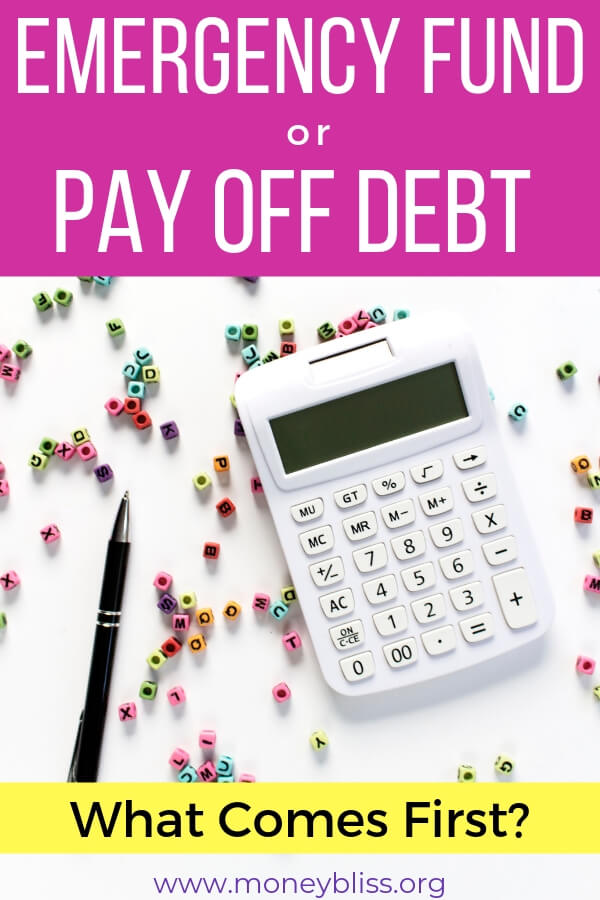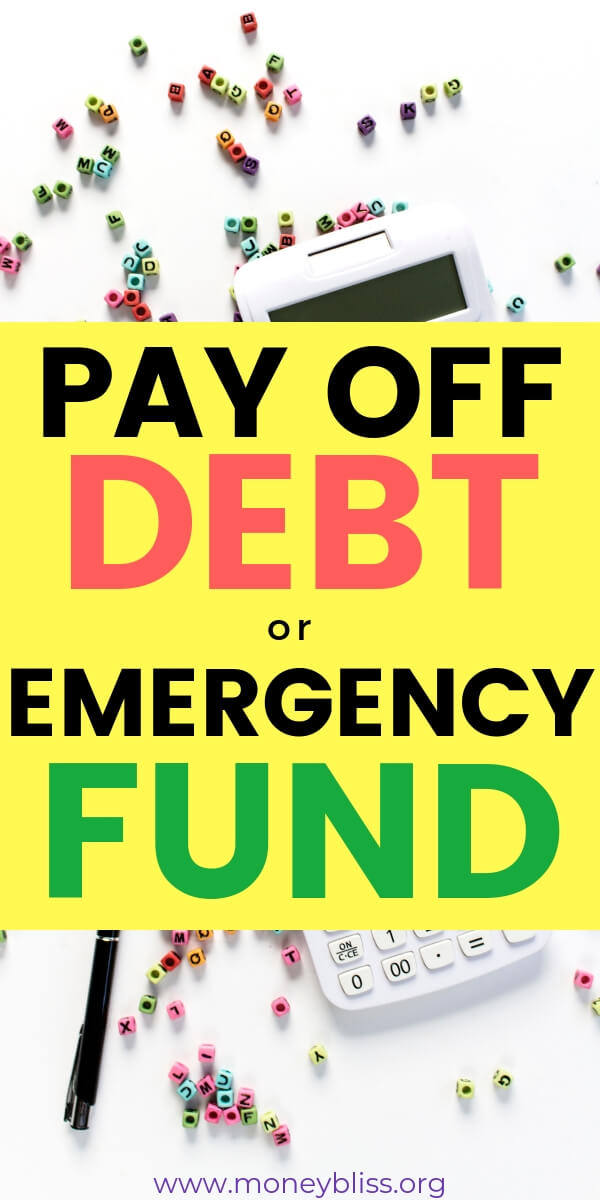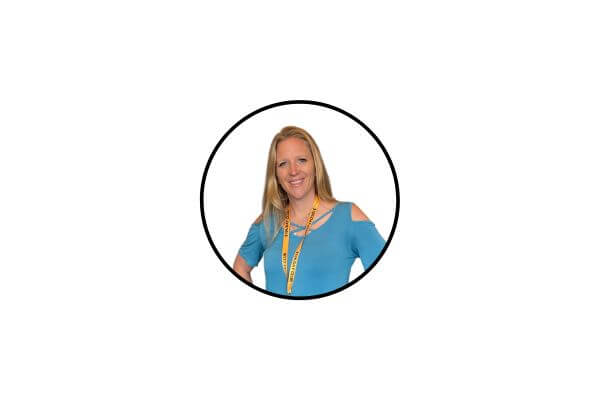What Comes First? Emergency Fund or Pay Off Debt?
This post may contain affiliate links, which helps us to continue providing relevant content and we receive a small commission at no cost to you. As an Amazon Associate, I earn from qualifying purchases. Please read the full disclosure here.
This is a question that comes up frequently. So, don’t feel like you are alone.
Emergency fund or pay off debt?
Should I save up to build an emergency fund? Or should I pay off debt?
Is it better to have a build emergency fund or pay off debt?
Well, the short answer is you need to do both. The trickier part which will we discuss shortly is what needs to happen when.
An emergency fund is one of the first financial milestones that needs to be accomplished. However, most people don’t set money aside just in case.
What is more important to stop living paycheck to paycheck and maybe someday reach financial freedom? What should you choose?
Shortly, you will have answers to all of your burning questions:
- How much money should I save before paying off debt?
- Is it smart to use savings to pay off debt?
- Does paying off debt count as saving?
- Should you pay off student loans or save for emergency fund?
People know that saving money for a rainy day is a good thing.
But, do you truly understand how much debt can hold you back from living the life you want to live?
What will be the biggest game-changer in your life?

Bottom Line of Pay Off Debt vs Emergency Fund
Most people unfortunately don’t do either – save money or pay off debt.
Why?
They get paralyzed in trying to make the decision of which comes first.
Plus the financial advice is SO vast and different that the average person would rather be doing anything else than looking at their financial picture.
So, right now, we are going to simplify this for you.
The key point to remember is do you want to manage your money or continue letting your money manage you. Break or continue the paycheck to paycheck lifestyle? The choice is ultimately yours.
So, getting back to build emergency funds or pay off debt, which one should come first? Don’t worry, we will let you know shortly.
Must Read: 10 Money Bliss Steps to Financial Freedom
What is the Purpose of an Emergency Fund?

The emergency fund is there to cover real, true emergencies. Cash to cover an emergency. That is the simple emergency fund definition.
Back in my college days, I thought that emergency funds was the savings account attached to my checking account to cover an overdrafts. Simple protection thanks to my bank. Um, hello? That young college student was totally wrong (and thankfully has learned from her mistakes).
In a perfect world, an emergency fund would never be touched. You saved up enough money to build your emergency fund and now it is there in cash you need it.
However, let’s jump back to reality.
When are in the beginning Money Bliss Steps to Financial Freedom, you will find yourself in more “emergency” money situations. That is completely okay, I promise! You are spending your money differently and it will take time to adjust to saving up for purchases rather than going into debt.
For instance, the car needs maintenance and repairs. Ugh. Those are dreaded words and a pretty price tag to fix it. Until you have sinking funds for car repairs, this would be paid from the emergency fund. And the BIG WIN for you…no need to charge it on the credit card!
Related Reading: Emergency Fund – Everything You Need to Know
The Need to Pay Off Debt

Seriously, debt is the cash flow killer.
You are unable to move forward because of the interest payments that never seem to end. The need and desire to pay off debt is real. But, first, think about what got you into to debt in the first place.
Many times the debt wheel starts moving when there wasn’t cash available to pay in advance for something. So, in order to stop the debt cycle, you must start saving money in advance.
So, pay off debt or emergency fund first?
Why yes, the need to pay off debt quickly is real. But, first you need to stop the debt cycle and the slippery slope of going into more debt.
When looking strictly at emergency fund or credit card debt, something must change. And fast!
Thus, you get the side I lean towards.
Get out of Debt Posts:
- How to Get Out of Debt in 5 Easy Steps
- Are You Making One of these Common Debt Payoff Mistakes
- Consolidating Debt 101: What You Should Know
- 7 Things to Give UP to Pay Off Debt Faster
Emergency Fund or Pay Off Debt?

In order to build a strong financial foundation, emergency fund comes first.
While paying off debt sounds more appealing, an emergency fund will guarantee long-term success.
Forty-four percent of Americans couldn’t cover a $400 emergency expense according to a study by the Federal Reserve in 2017. That percentage has actually been improving over the last 4 years, too. Plus, across income levels, that same statistic hardly varied.
The lack of an emergency fund causes undue stress and accumulating credit card debt.
All in all, the question of the emergency fund or pay off debt is much like the cart before the horse analogy.
How far can you get if you put the cart first?
Emergency fund vs. pay off debt.
Which one will get you further along? Specifically the one that has long-term success.
How Much Money should I Save Before Paying Off Debt?

At Money Bliss, our recommendation is 2% of annual salary with a minimum of $1,000 for a recommended emergency fund size. This is where you can learn everything you need to understand about emergency funds.
Another common question is where to put emergency fund. It is best to keep an emergency fund in an online savings account. The money is set aside and harder to access. But, still within a quick reach.
That brings us to the next elephant in the room. Is it smart to use savings to pay off debt?
If you have more than the recommended emergency fund size, then yes take that cash and pay off debt. Grasp! I know this is difficult for many people to fathom. That is when it is smart to use savings to pay off debt.
But, I can tell you from personal experience that in order to move forward, the longer you delay in paying off debt, then you are just delaying the inevitable. It will take much longer it takes get out of your current debt cycle and to move through the Money Bliss Steps.
For those of you screaming, but I need a bigger comfort than just $1,000, then decide on what works for you and your family. The true definition of an emergency fund does not include 3-6 months expense or saving for big purchases (that happens during Money Bliss Step #5). That would be called a rainy day fund.
It is a simple emergency fund. Who knows what it will cover?? The true emergency fund definition. The absolute maximum recommended emergency fund is $5,000.
Related Reading: Money Bliss Steps for Financial Freedom
What About the Debt Interest Rates

Remember, it is about building a strong foundation. Something that won’t blow away in the first money emergency.
Put blinders on the debt interest rates for now. Stop using any debt.
Then, you can avoid paying extra interest on items you can’t afford.
Once the emergency fund is fully funded, make a plan to get out of your debt. That is the time when debt interest rates become a priority.
Related Post: Debt Snowball vs. Debt Avalanche – Which Method is Best?
Should you pay off student loans or save for emergency fund?
Unless you are able to qualify for loan forgiveness (which is tricky to accomplish), then you need to pay off your student loans.
However, your emergency fund must come first. Get that established and then move on to paying off debt.
Many people will tell you that you may be able to make more in the stock market than your interest rates on your student loans. However, that comes with a higher risk. Plus if you have a limited income, then you don’t have enough money to spread around and fund everything.
Therefore, stay focused on one money goal at a time.
To answer the question, does paying off debt count as saving? No, you must first pay off your debt. Then, that is the amount of money you have available to start saving money.
What Next for Emergency Fund or Pay Off Debt?
- Open an emergency savings account. Right now, CIT Bank’s Savings Builder Account account offers a great interest rate or APY, which is typically over 15 times the national average, with a minimum opening deposit of $100. The higher the APY, the faster you’ll save.
- Start saving for that emergency fund. Make sure you know exactly how to handle your emergency fund and get on a quick path of savings!
- Make a plan to pay off debt. Stop the cash flow killer and start enjoying life. Need motivation? Check out the Everything You Need to Pay Off Debt. Also, get your debt free date here.
- Make sure you aren’t making any more of these money mistakes!
Don’t despair.
You can move past this debate of emergency funds or paying off debt.
Don’t delay. Start now.

Did the post resonate with you?
More importantly, did I answer the questions you have about this topic? Let me know in the comments if I can help in some other way!
Your comments are not just welcomed; they’re an integral part of our community. Let’s continue the conversation and explore how these ideas align with your journey towards Money Bliss.


